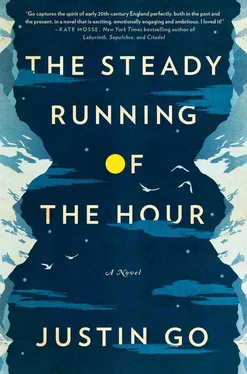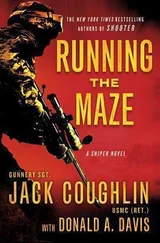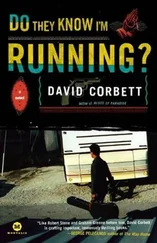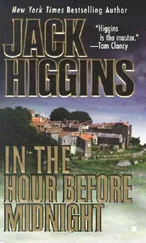She does not know where she is going. The sky is drizzling as Imogen turns west on Oxford Street, the shops and sidewalks, the motor drays and omnibuses appearing and dissolving as her mind runs in frantic circles. She thinks back to Eleanor two weeks ago, when Imogen had told her she was pregnant and Eleanor had fallen silent, then taken her hand and said it would be all right. She remembers the last night with Ashley at the Langham Hotel, the lights turned off and the curtains drawn, Ashley kissing her bare shoulder and saying it was all right no matter what happened to him in France, that to truly love one person was the most anyone could ask of life, even if it lasted only for a week—
Don’t say such things , Imogen had told him. Never say them, Ashley.
The rain quickens as Imogen crosses Vere Street, the newsboys running for shelter into the doorway of Marshall & Snelgrove. But Imogen is already soaked, the cold water running down her neck into the collar of her frock. She walks all the way through Hyde Park into Knightsbridge until a white-haired man on the Brompton Road sees her crying on the sidewalk. He raises his umbrella to shelter her from the downpour.
— I beg your pardon, but madam, you’re soaked to the bone. You’ll catch pneumonia. Can’t I help you in any way?
It takes Imogen five minutes to persuade him to leave her be, fabricating some tale about how she has always walked in the rain without an umbrella, ever since she was a young girl, and she does not at all mind being wet. The man shakes his head, watching her in the rain.
— Madam, we’ve all lost something in this war. But we must carry on as best we can.
Imogen walks back through Hyde Park Corner carrying the man’s umbrella. She goes into a bureau de change in Piccadilly and changes the rest of her francs for sterling, but she spent so much on the journey to France that she has only one pound, six shillings left. At the post office on Regent Street she writes two different telegrams to Ashley, tearing up each of them in frustration. He is too far away and there seems nothing she can say that will change anything. She walks down the street to a branch of the Westminster Bank, but none of tellers will let her draw from her father’s account, even if she has the checkbook, and when they go to fetch the manager she decides to walk out rather than be humiliated further.
You mustn’t despair. You mustn’t think at all. Only keep going.
Imogen walks to the Alpine Club on Savile Row. The office is closed, but the club porter answers the door and Imogen asks for the London address of her cousin Hugh Price. The porter shakes his head. He says that Mr. Price does not reside in London, and in any case he is on active service in France.
— Miss, I believe you’re chattering. Won’t you come inside to warm up?
— You’re very kind, but actually I’m in quite a hurry—
It is growing dark now and Imogen walks faster to try to stop her shivering. She must get into dry clothes. She goes to three hotels but they are far too expensive, for Imogen knows her money will have to last, and the last clerk says he cannot recommend a cheap hotel for a young lady. Finally she goes to the YWCA on Baker Street and pays two shillings for a membership card and a bed in a frigid room furnished only with a small table and a Bible. The light is off and someone is snoring in the other bed. Imogen hangs up her wet coat and frock and pulls the papery sheets over her, still wearing her damp cotton crinoline. The blanket is scratchy and it smells of mothballs. She reads the poster on the wall by the moonlight.
TO THE YOUNG WOMEN OF LONDON
Is your ‘Best Boy’ wearing khaki? If not, don’t YOU THINKhe should be?
If he does not think that you and your country are worth fighting for — do you think he is WORTHYof you?
If your young man neglects his duty to King and Country, the time may come when he will NEGLECT YOU.
Think it over — then ask him to JOIN THE ARMY TO-DAY
She has a violent urge to tear down the poster, but it is hung over the other woman’s bed and Imogen feels too weak to get up. She turns her back to the poster and curls her legs, drawing the sheets and blanket tightly around her. Imogen sleeps fitfully for a few hours. She cries sometimes and hates herself for crying, thinking of the girls who must have wept in this room, angry that she should be one of them; she pities herself for having no one to turn to, then grows angrier still that she should need anyone. At eleven o’clock the girl in the other bed rises and dresses in the dark, pulling on coveralls and a cap. The girl goes out without a word. Imogen stays in bed.
By five o’clock she is frantic with insomnia and she tries counting backward from a hundred to fall asleep, first in English, then in French and German and Swedish, but she counts too fast and soon her heart is racing. Imogen tosses back the covers and dresses hurriedly, her clothes as wet as ever. She walks down Baker Street in the pale morning, forming words in her mouth without any breath.
You’re hopeless. You couldn’t last a single night, without even a child to care for.
Soon she is talking to Ashley and the child itself, saying foolish and extravagant things, swearing that she loves the child more than herself, that she is certain it will grow to be pure goodness, as brave and virtuous as its father. The sky is brighter with each block she passes and by Cavendish Square the sun is warming the sidewalk. Imogen has been gone for twenty hours and walked eight miles. Her legs are sore and there is a chafing sensation in her left shoe that she supposes is a blister; she is tired, hungry and dirty, and she feels angry with everyone in the world, most of all herself for doing the one thing she had sworn against. She climbs the stairs and turns the key in the lock.
The house is quiet. Imogen catches her reflection in the hallway mirror: an unruly thatch of bobbed hair, deep and dark circles under her eyes. She goes downstairs into the kitchen. Her mother is standing with the cook before the gas range, a large wooden spoon in her hand. Imogen’s voice is sharp.
— If we’re going, I wish to go at once. I can’t stand to be in London any longer.
The cook looks away into the pot. Her mother opens her mouth to answer, but Imogen walks out of the kitchen.

I have Imogen’s letters now. Every night I doubt that I found them and every morning I pull out the trunk from under my bed and flip back the lid, opening the envelopes and touching the sheets of brittle paper. I feel sure that I’m getting closer to something, if only I’ll recognize it when I see it. Because the signs are everywhere, I just don’t know what they mean.
At the Internet café in the village I write Prichard an e-mail explaining the letters. There’s no phone at the house but I send Mireille’s cell phone number in case he needs to call me.
We spend the night at a farmhouse several miles away with Mireille’s friends, nine of us dining at a long table on simple food and prodigious quantities of wine. Afterward they talk in French by the fire; half listening, I stare at the flames and spell out the letters in my notebook, S-O-M-M-E, as if one code were the answer to them all. At midnight Mireille stands up before the fireplace, her shadow long before her.
— On y va , she calls. Let’s all go for a walk.
Outside there is no moon but plentiful stars, the galaxy streaked white above our heads. We follow a gravel path through the dense forest. After twenty minutes we reach a great wooden cross in the middle of the path, set high on a stone plinth without ornamentation or inscription. I realize this is our destination. As they drink the others become more jubilant. Some lean against the pedestal and swallow wine in huge gulps. Others sing and shout into the dark trees. I ask each of them in turn about the cross.
Читать дальше













